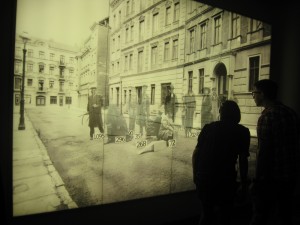
The beginning never ended. Here we stand now and from here we move on. History has shattered.
I was brooding on this, when together with other ISU students, I went on a tour of the Berlin Museum of German History—a journey spanning over two thousand years of history, the living ashes of the Phoenix of human development, the twisted path of a nation, carefully crafted into an argument- “Wir sind ein Volk.”
The central idea of the whole tour was to show the artificiality of history and its improper use as the objective representation of what has been, focusing on the room history allows for interpretation and humankind’s tendency to transform it into a highly versatile tool – political, social, and economic. My goal is not to discuss the morality of the issue; rather, I will focus my attention on its necessity and meaning.
History is art. Just as a painter works with colors and obscures some aspects of a painting to shed light on others, so does the historian arrange facts, link together events into causal chains which he later uses to bind together a narrative. Lessons, dramas, joys, and tears – all of which comprise history, and none of that was really what it was. Just like any other art form, history cannot present an objective narrative. Still, just like any other art, it is based on a true story. This perhaps is an unconventional understanding of the concept, but it seems straightforward enough so as not to be too provocative or illogical.
What differentiates history from many other forms of art is its usage and creation. The Museum of German History is a very good example of the many ways in which history can be (and has been) used. It became very clear during the tour that the artifacts presented in the museum were arranged with much thought, and more importantly, with purpose.
As you walk up the staircase, a sign on the wall reads “The history of Germany, from the beginning to modernity.” At the top of the staircase there is a beautiful Greek mosaic, and next to it, the gravestone of a soldier, fallen on the battlefield of Teutoburg Forest – the beginning of German history.
The very concept of the beginning of history can of course be argued to be meaningless, but in the art of history, the beginning is what makes the rest possible. It binds together the story of a nation, allowing the nation to exist, setting deep its roots and providing a background, against which its people are to stand out, united and unique. The very existence of a beginning is perhaps more important than its nature.
The beginning is established by historians. With a retrospective eye, they pinpoint an event that best suits the demands of modernity. At its root, history serves to make an argument and is focused on the present. As you walk through the museum, you see the story of the nation unfold. The Greeks, the armor of the fallen Turks, the towering Prussian generals, Napoleon – everything shows the history and greatness of Germany, but perhaps more importantly its unity as a state and a nation, defined through its culture and in contrast with its neighbors.
When viewed this way, history loses a large part of its value. Stripped off much of its romanticism by the almost cynical eye of an outsider, it shatters into individual destinies, into stories so small they cannot be seen with the naked eye. The causal chains of events break. The system crashes; we see a pile of chaotically tangled lives, and we wonder what chances there were of us coming into existence. This is history.
by Mikhail Shakhanazarov (ISU’11, Kyrgyzstan)
